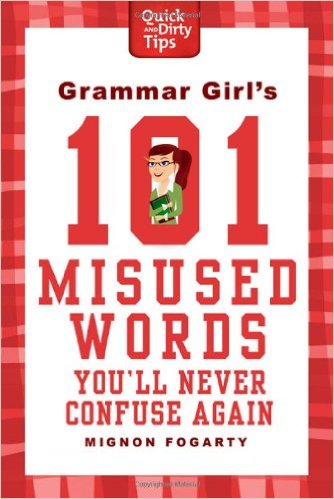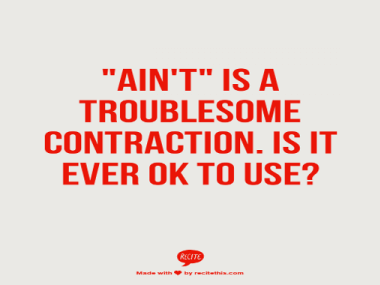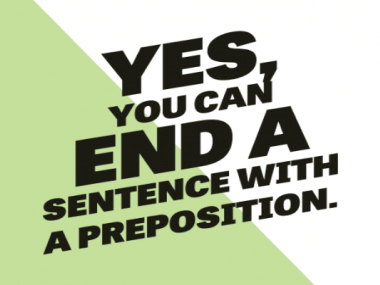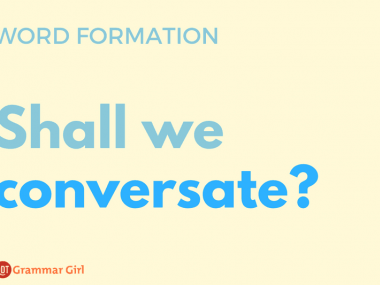‘Irregardless’ Versus ‘Regardless’
If it’s in the dictionary, does that make it a real word?

Today’s topic is “irregardless.”
Hi, Grammar Girl. I’m an English teacher in Boston, Massachusetts, and I am freaking out. One of my students tells me that “irregardless” is now a word, and apparently it’s been added to some dictionaries. Can you clear this up for me? This is serious panic time.
In the immortal words of “The Hitchhiker’s Guide to the Galaxy“: Don’t panic. “Irregardless” is a word, but it’s not a proper word, and your student’s assertion that it’s in some dictionaries is a great opportunity to talk about the different kinds of entries in dictionaries.
‘Irregardless’ Versus ‘Regardless’
First, let’s talk about “irregardless.” Some people mistakenly use “irregardless” when they mean “regardless,” and that’s considered to be an error. “Regardless” means “regard less,” “without regard,” or “despite something.” For example, Squiggly will eat chocolate regardless of the consequences (meaning Squiggly will eat chocolate without regard for the consequences, despite the consequences, and so on).
The prefix “ir-“ is a negative prefix, so if you add the prefix “ir-” to a word that’s already negative like “regardless,” you’re making a double-negative that means literally “without without regard.”
Buy Now

The first example the Oxford English Dictionary (OED) shows for “irregardless” is from another dictionary: Harold Wentworth’s American Dialect Dictionary from 1912, which places the origin of the word in western Indiana. Other words from the American Dialect Dictionary include “doodad,” “dojigger,” “finagle,” “fuddy-duddy,” and “nummies” to describe delicious food. We definitely know how to make up silly words.
But I have good news, Hoosiers! A Google Books search shows “irregardless” appearing earlier in other locations. I found it in documents from the State of Michigan from 1893, a publication from the State of California from 1887, and the wordhistories.net website has a screenshot of a poem called “The Old Woman and the Tabby” that uses “irregardless” in the City Gazette & Daily Advertiser newspaper published in Charleston, South Carolina in 1795. It looks like “irregardless” got around, even in the early days, and was also used quite eloquently. For example, here’s the “irregardless” sentence from Dr. J. B. Trembley’s 1887 report about meteorology for the State of California:
“The winds would blow; the storms would come; the heat would vitalize; the cold would freeze; and the various seasons would pass, irregardless of what men could do or say, as warnings, of the weather on the morrow.”
Language experts speculate that “irregardless” comes from a combination of the words “regardless” and “irrespective” and that another reason people might say “irregardless” is that they’re following the pattern of words such as “irregular” and “irreplaceable.” But “regardless” already has the “-less” suffix on the end, so it’s not like “regular” and “replaceable.” It’s already negative. And because “irregardless” is a double negative, some people also speculate that it could have arisen because people sometimes use double negatives for emphasis.
Standard Versus Nonstandard English
Now, on to dictionaries. Although it’s true that the American Heritage Dictionary, the Merriam-Webster Online Dictionary, Dictionary.com, and the OED all list the word “irregardless,” they also all call it “nonstandard.” Listing a word as nonstandard is a way that dictionaries concede that a word is in common use, but isn’t really a proper word. Standard language is defined as the language spoken by educated native speakers, but comprehensive dictionaries also include nonstandard words, dialect, colloquialisms, and jargon–words like “ain’t,” “conversate,” and “irregardless.” It seems pretty common for people to look up a word in a dictionary, and if it’s there, they think it’s fine to use that word in every circumstance. It’s the “Look, it’s a word!” phenomenon. But you have to look a little further to see what kind of word it is, and if it’s nonstandard in some way, you should use it with caution. You’ll sound uneducated if you go around saying things like “I ain’t gonna conversate with him irregardless of the consequences.”
Sometimes words make the transition from nonstandard to standard English. My dictionaries assure me that “snuck” is a word that falls into this category (although I know some of you won’t like that). But since “irregardless” has been disparaged its whole life, and many educated people still rail against it, and the word isn’t commonly seen in edited writing, I don’t believe “irregardless” is going to make the transition to standard language any time soon.
I don’t believe “irregardless” is going to make the transition to standard language any time soon.
Prescriptive Versus Descriptive Dictionaries
And one final thought about dictionaries—“irregardless” was listed in every dictionary I checked, but sometimes words will show up in one dictionary and not another, and it’s important to realize that there are different kinds of dictionaries. For example, there are prescriptive and descriptive dictionaries.
A prescriptive dictionary focuses on the way language should be according to traditional rules, and a descriptive dictionary focuses on the language that is actually in use by the population. So a descriptive dictionary is likely to include words that a prescriptive dictionary would leave out. Many older dictionaries are prescriptive, but most modern dictionaries are descriptive.
What Is a Word?
The common rant you’ll hear people saying about “irregardless” is that “irregardless” is not a word, which brings us to the question, “What is a word?”
That can get tricky, and I’ve gotten into debates about whether a word that was used 100 years ago and isn’t in most dictionaries and nobody today would know what it means is still a word, and we just agreed to disagree. (If you’re curious, I was on the side arguing that it’s still a word.) But I think it’s more straightforward with “irregardless.” It’s in all major dictionaries with a definition, and when people use it, you know what they mean, even if you pretend you don’t because it’s a double negative. “Irregardless” is a word. It just isn’t a word you should use in seriousness if you want educated people to respect you or take you seriously.
Thanks again for the question. If you’d like to hear your question on the podcast, you can leave it as a voicemail at 833-214-GIRL. That’s 833-3214-4475.
Mignon Fogarty is Grammar Girl and the founder of Quick and Dirty Tips. Check out her New York Times best-seller, “Grammar Girl’s Quick and Dirty Tips for Better Writing.”





